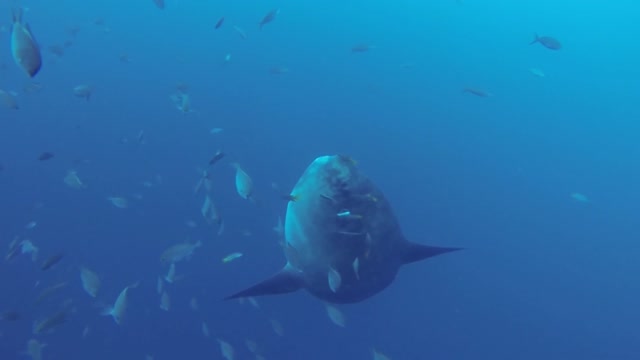Premium Only Content

Scientists document giant Mola Mola at deep ocean cleaning station Part:4
Scientists document giant Mola Mola at deep ocean cleaning station
Mola mola are reclusive fish that are rarely caught on video. They inhabit colder waters of the Galapagos Islands and other parts of the oceans around the world. They are the largest bony fish in the world, weighing up to a whopping 2300kg (more than 5,000 lbs). They have evolved into one of the ocean's most bizarre fish, with a body shape that prevents them from swimming quickly except for very brief bursts of speed.
They move slowly through the water with their mouths open, eating fish, jellyfish, and eggs. It was previously believed that their main diet was jellyfish, but these make up only 15% of the Mola mola's diet. Clumsy fish, they have only the remnants of a tail. They propel themselves forward by flapping their dorsal and anal fin in unison. They have no means of defense from predators except to dive deep to areas that predators are unlikely to follow.
The Mola mola produces more than 300,000,000 eggs at once, the most of any known vertebrate. They migrate great distances and can cover 26km (16 miles) in a single day. They sun themselves on the surface, lying flat. This is where they are most often seen. Few scuba divers are lucky enough to encounter these giants swimming freely in the depths.
These biologists have found a large Mola mola at what is known as a cleaning station. The larger fish suspend themselves vertically, a signal for smaller fish to come and eat the parasites and dead skin from their bodies. It is very rare to find evidence of a Mola mola engaged in such behaviour. The fish is surprisingly unconcerned with the divers as they make a cautious and respectfully slow approach to capture this amazing event on video. Mola mola are becoming increasingly rare due to previous over harvesting, and entanglement in gill netting used for other fish. We must study these mysterious animals more to understand how to provide conservation efforts that will ensure that we do not lose them forever.
-
 LIVE
LIVE
Wendy Bell Radio
5 hours agoThe MAGA Diet
13,873 watching -
 DVR
DVR
Graham Allen
2 hours agoGRAHAM MAKES YUGE ANNOUNCEMENT!! + LIBERAL REP ROOTING AGAINST AMERICA?!
18.2K43 -
 LIVE
LIVE
Randi Hipper
56 minutes agoETHEREUM PRICE BOUNCES AFTER BILLION DOLLAR HACK!
162 watching -
![Massive Paradigm Shift: Bongino Hired At FBI; Joy Reid Fired At MSBNC [EP 4450-8AM]](https://1a-1791.com/video/fwe1/52/s8/1/u/2/_/e/u2_ey.0kob-small-Massive-Paradigm-Shift-Bong.jpg) LIVE
LIVE
The Pete Santilli Show
15 hours agoMassive Paradigm Shift: Bongino Hired At FBI; Joy Reid Fired At MSBNC [EP 4450-8AM]
2,321 watching -
 1:27:17
1:27:17
Game On!
14 hours ago $2.37 earnedAnother Monday without football...
36.8K8 -

Jeff Ahern
2 hours agoMonday Madness with Jeff Ahern (Ding Dong the Witch is Gone!)
29.4K2 -
 34:56
34:56
Athlete & Artist Show
22 hours ago $1.61 earnedCANADA WINS GOLD AGAIN!!
25.8K2 -
 15:27
15:27
T-SPLY
1 day agoCNN Forgets President Trump Can Fire Anyone He Wants From The Pentagon
36.9K22 -
 15:13
15:13
Clownfish TV
21 hours agoBluesky Trusts the Science? Scientists FLEEING X for Bluesky!
46.8K10 -
 29:50
29:50
The Finance Hub
16 hours ago $6.52 earnedBREAKING: TULSI GABBARD JUST DROPPED A MAJOR BOMBSHELL!!!
41.9K37